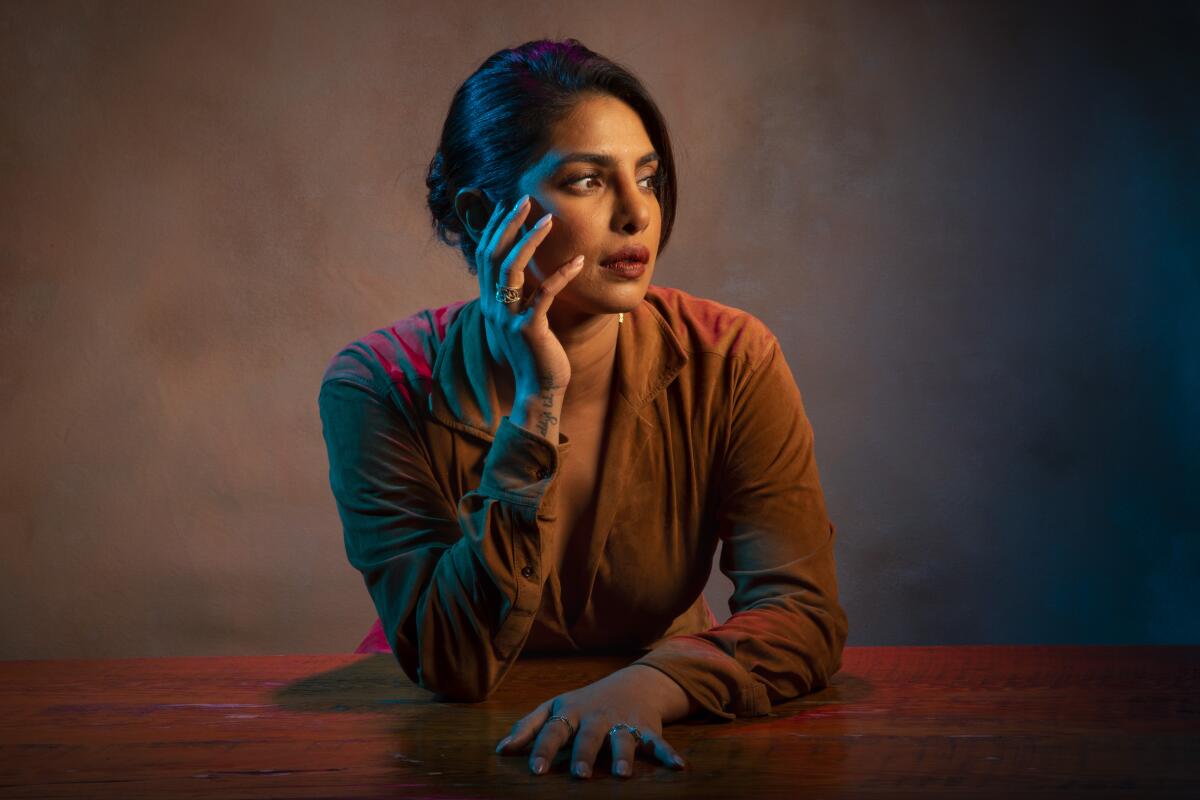Pageants, films, books? Check. But for Priyanka Chopra Jonas, thereâs still much ahead

A virtual interview reveals many things: When Priyanka Chopra Jonas calls in for a chat first thing in the morning, sheâs fully made-up and fashionable, a fireplace roaring in the background. Turns out sheâd gone glam for something else, a group interview ahead of her new memoir, âUnfinished,â and happily reveals that out of the camera view sheâs sitting around in sweatpants. A veteran actor, Miss World 2000, former UNICEF goodwill ambassador and wife to a Jonas brother (Nick), Indian-born Chopra Jonas contains multitudes.
She also plays the most sympathetic character in Netflixâs new âThe White Tiger,â a dark, funny, socially pointed thriller about a lowly servant who aspires to greatness in modern, tech-savvy India. Chopra Jonas recently spoke with The Envelope.
Iâve never interviewed anyone who once was considered the most beautiful woman in the world. Is that memory the sort of thing you keep in your back pocket for days when youâre feeling low?
[Chuckling] No, when I won Miss India and then Miss World, I was very insecure. I was gawky, and I used to be so introverted. When I won, it didnât register in my brain â I didnât rest on my laurels; I just went on to the next thing. Iâve always been competitive and ambitious. Miss World was a step in my ladder, but it was never a validation about how I felt about myself.
Youâve become dedicated to feminist causes in the years since. Has that changed your opinion about beauty pageants?
Thereâs two sides to that coin, and I agree with both of them. My pageant gave me a massive opportunity. In those two pageants â the only ones Iâve really ever been in â I was not reduced to my looks. I was taught to sharpen my wit, speak with eloquence, to engage with heads of state and journalists.
You make it sound like finishing school.
It was, because I came from high school. I was in my sneakers and jeans at that point. Suddenly, I was in stilettos and speaking to heads of states and having opinions on economies. I had to learn. It was either sink or swim. I had to choose to swim.
In âWhite Tiger,â we get a snapshot of an India many American viewers might not be familiar with â the servant culture. How accurate is it?
The movie is a reflection on a class divide that exists around the world. This is an inside-out perspective of a man who is trying to pull himself out of the circumstances of his birth, and the hunger he has of ambition. That is what is important to focus on. I cannot ever comment on what is accurate or not for a country as large as India â but it is definitely accurate as the story of an underdog. That exists around the world.
Before all of this â pageants and acting â you had planned to study aeronautical engineering. What was the appeal?
My parents were both doctors, and I come from a very academic family. I knew at a very young age that I did not want to be a doctor. And I was an academic cockroach â I loved math, physics, science. As an 11-year-old, I flew for the first time on a military plane to meet my dad. I remember thinking, âHow can you fly?â The aerodynamics of it was magical to me. So I remember leaning into physics. I was always fascinated with planes, and now I spend most of my life on them.
You now have this enormous international celebrity, and two years ago you married someone who is also internationally famous. Did that familiarity with the spotlight provide some connection for you two early on?
No, the celebrity of it was not even a conversation in our lives. We just met as a boy and girl. He slid into my DMs on Twitter and reached out to me. We loved the fact that we came from really large families, we have the same family values, the same ambitions, and we dream big. Also, we both donât know how to cook. My husband can make great sandwiches, though, so weâll survive.
Your memoir, âUnfinished,â comes out next week from Penguin Random House. What, for you, remains unfinished?
I want to take on roles that make me nervous and uncomfortable. I want to check in with my artistic self and lean in as a producer and tell the stories I want to see â female stories, South Asian stories. I want to be an entrepreneur. Probably have a family. Thereâs so much. I feel like itâs been 20 years that Iâve been doing this, but thereâs so much that, God willing, given the opportunity I still want to do.
More to Read
From the Oscars to the Emmys.
Get the Envelope newsletter for exclusive awards season coverage, behind-the-scenes stories from the Envelope podcast and columnist Glenn Whippâs must-read analysis.
You may occasionally receive promotional content from the Los Angeles Times.










